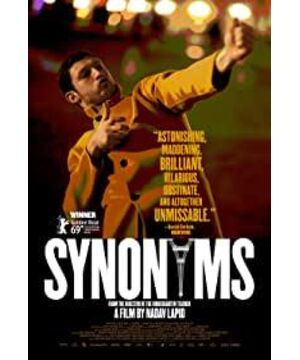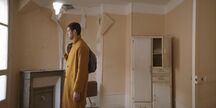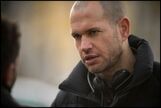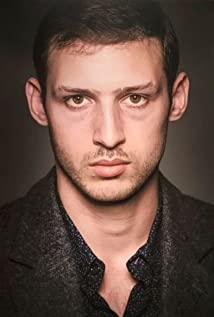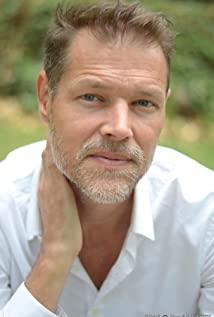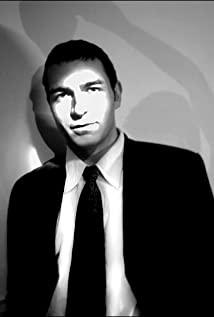There are two difficulties to enter the film:
1. It is difficult to substitute for refugee status in Israel.
Israelis have a special status among refugees in the Middle East. The Jewish people who wandered for two thousand years moved back to Jerusalem after being massacred in World War II and established a state there. Most of these people who returned to Jerusalem were intellectuals who stayed in Europe. The Israeli writer Oz mentioned his parents in "A Story of Love and Darkness". His mother spoke 4 or 5 languages, and his father spoke 16 languages. After the founding of Israel, His father worked as a library administrator, and you can imagine the average literacy level of Israelis. So far, Israel's education is one of the best in the world.
So Yoav cannot be seen as an ordinary refugee from a war-torn country. He is also clearly explained in the film: he was reluctant to go to the battlefield against the war, and in the shooting training scene, he said, "The trigger of the machine gun is difficult to handle, but the real test of the gunman is actually to play Pink Floyd ( The translation I read was wrong, it has been changed here)", clarifying his identity and cognition - against people being alienated into war machines. Then, before shooting, he asked the Philosopher's boss, "What song is this?", he shot to the beat, and it was "I Don't Want to Work." Therefore, the film is cut from Kochi's perspective, discussing human nature itself.
2. Film vocabulary is non-traditional.
Rapide himself studied philosophy, so he used a lot of symbols, metaphors, puns, and rhetoric in various texts and editing, making the film very abstract - but from the sound and picture point of view, it is basically a grounded and realistic expression — so the most disjointed, hard-to-reach places are probably here, but that again becomes his unique cinematic vocabulary.
Plot:
The text of each paragraph is at least a coherent and precise expression of what the director wants to express. For example, in the first paragraph, which is the easiest to understand, an Israeli Jew, from the outside to the interior, was "revived" by the French upper class, which is not elaborated.
In the overall plot, Israeli refugees arrived in Paris, hoping to get rid of the country that alienated civilians as war machines and integrate into Western European society as much as possible, but found that the people here were also alienated to the extreme - emptiness and hypocrisy. In addition to the traditional cultural conflict here, it is also the collision of two states of human beings: on the one hand, there are dignified and moral people who have defected from the hell of war, and on the other hand, there are empty and "moral degenerate" people who have rotted away in the paradise of peace ("Moral degeneration"). Moral decline” in quotation marks, detailed later).
His whole mindset ranges from being redeemed (never looking up at Notre Dame and saying my friend and lover Caroline saved me) to total denial of French culture (simulating shooting at Notre Dame). The video takes us as he goes through these:
a. French-style depraved love:
From the heartbeat of first meeting Caroline; to the anecdote that Caroline had sex with many people, at first he was skeptical and then categorically rejected "such an opportunity"; to Caroline taking the initiative to seduce and start betraying Émile; A story tells Émile to let him use it; to Émile's distressed look when Émile proposes a fake marriage; to the line "everyone's generosity is limited" when Émile agrees to return the story; to Yoav and Caroline saying "it must be Stop this" when he found that Caroline couldn't hear him at all and called him "Dikka". These experiences led him to see himself in an "immoral" situation of betraying his friends by indulgence (moral judgment is particularly clear based on his Jewish identity). Finally, in the Caroline band, he questioned "whether a wife has the freedom to choose her husband" - since Caroline has this freedom, why did she choose to make people fall into an immoral situation.
b. Degenerate literature and art:
Émile, who is in the "high society" of Europe, has long been unable to draw inspiration from life itself, and can only write empty words that look good on the surface but cliché like postcards. Caroline plays the oboe in the district orchestra, but is described by Émile as a kind of potato craftsmanship. - There is no artistry, the senseless feeling that Yoyav felt when he went to help the artist make nude videos - "What am I doing here". In contrast, the stories he told Émile were true and bloody and romantic, and he mentioned that the violin in the eyes of his "coward" colleague - the subconscious part of the war machine as a "human", the music in the eyes of Yoav. Milwa is always fighting—pink floyd, "I Don't Want to Work"—and unlike Émile, music is the antidote to a dry spell. This is his reflection on European contemporary art.
c. Indifferent social relationships:
Yoav had just come to work at the embassy, and felt the indifference of the staff to others; the next time he faced the Jews who were blocked from the door in the rain, he removed the railings to let everyone "cross the border", saying "Jews cannot let them go." my compatriots in the rain". He was dissatisfied with this indifferent environment.
d. Marginalized racial identities:
For Joyaf, Israel and Jews are identities he is determined to get rid of, because he hates himself alienated by war, and he recites the Israeli national anthem dryly and forcefully in Hebrew in his immigration class. According to the director, it is right. "Abandonment" of the state. But his friend Ahon was not. He likened Ahon to Hector, the warrior who knew he was going to lose but didn't admit defeat. He saw Ahon in a bar asking the French "Do you know Israel?" In response, he saw Ahon humming the Israeli national anthem in the subway like a bullfight against the indifferent faces of passersby while the faces were blank. When Yoyav talked about Hector's ending, he attached a picture of a car driving on the streets of Israel, with one dragging behind him. But Yoyav compared the man hanging on the car to Hector, and then compared it to Yahon, to describe the fate of this group in Western European society who struggled desperately and must lose.
e. Survival Dilemma - Hunger:
At the beginning of the opening, Yoav was robbed of nothing. He wore Émile's clothes, spent the money given by Émile, and lived frugally every day, but his job in the embassy was fired because he put Jews in the embassy. He could only go to the bar to steal food. . Finally, after singing the French national anthem in immigration class, he decided to go back to his old business - to become a foreign soldier, which directly affected his self-identity.
f. Self-Identification:
When he was in Israel, Yoav agreed with pink floyd, "I don't want to work." In Paris, he was forced to put on a military uniform again because of his life. He realized that alienation was inevitable, and he ran to Émile to get back his most precious things. -- those stories of his own, Émile agrees but makes a pun "I understand that everyone's generosity is limited", which pushes him back into the question of a, and begins to thoroughly reflect on what he has done.
Before Caroline's performance, he questioned the members of the band, and everyone ignored him and went on stage to perform. Caroline finally came out to face his expression, "I know this country has fallen." However, she turned back to perform, and she couldn't do anything.
At the beginning, Yoav and Émile talked about the Seine, saying that the Seine is like a test question for people, "The beauty of Paris is just a charity to foreigners, so that they can't see the essence of the city, which is not her essence. Beauty, not her woman, not her splendor, I don't know what it is", Émile said, "I'm not sure if the essence you're talking about exists." In the end, Yoav saw it, but the people in it couldn't.
View more about Synonyms reviews


